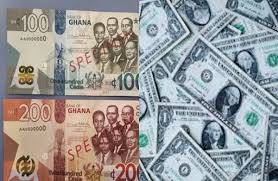Ghana's cedi has endured a tumultuous year, earning the unenviable title of Africa's third-worst-performing currency. Despite a $3 billion bailout from the International Monetary Fund following a default in 2022, analysts foresee further depreciation ahead. The currency has already weakened by over 7% against the dollar, with ongoing challenges in negotiations with Eurobond investors complicating matters.
While Ghana has made strides in discussions with domestic and official creditors, the impasse with Eurobond investors remains unresolved. Despite a rise in international reserves to $5.9 billion in December 2023, a 10-month high, experts deem these levels insufficient to bolster the currency effectively. Economist Courage Boti from GCB Capital Ltd. in Accra warns that without Ghana's suspension of foreign debt payments, the cedi would have plummeted further. The upcoming presidential election in December adds to foreign exchange demand pressure, amplifying uncertainties.
Ghana declared a moratorium on foreign obligations in December 2022 due to the compounded challenges of the Covid-19 pandemic and Russia's invasion of Ukraine. Subsequently, successful restructuring of domestic bonds and a preliminary agreement with bilateral lenders to renegotiate $5.4 billion in loans have been achieved. However, negotiations with Eurobond holders, owed $13 billion, are still underway. Once debt restructuring concludes, foreign investors may view Ghana's investment landscape more favorably, though political risks loom large.
Despite the optimism surrounding potential economic recovery, pre-election import surges could disrupt the nation's economic equilibrium. As a major cocoa producer heavily reliant on imports, Ghana's economy faces vulnerability to fluctuations in demand. Nonetheless, the government projects GDP growth to rise to 2.8% this year, up from 2.3% in the previous year.
Kweku Arkoh-Koomson, an economist at Databank Group, highlights the central bank's policy priority of rebuilding foreign reserves under the IMF program. This entails refraining from excessive market intervention, instead focusing on volatility mitigation. Arkoh-Koomson predicts the cedi to weaken to 13.7% against the dollar by year-end, reflecting a cautious outlook amid uncertainties.
Despite these challenges, Bloomberg data indicates minimal movement in the cedi's value, trading at GH¢12.9267 per dollar as of 10:41 a.m. in Accra, underscoring the delicate balance between economic stabilization efforts and prevailing market forces.



No comments yet
Be the first to share your thoughts!